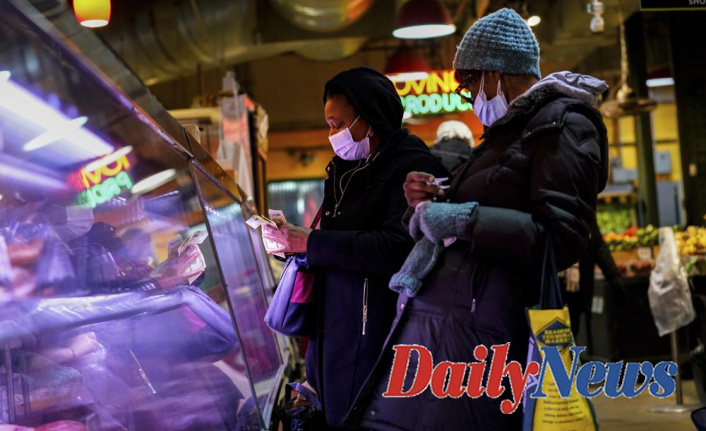According to data from Johns Hopkins University, Saturday's total confirmed cases barely exceeded 100,000. This is a sharp decrease from the 800,850 reported five weeks ago, Jan. 16.
New York saw a drop in cases by more than half over the past two weeks.
"I believe what's driving the decline is that the omicron's starting to run out of people for infect," Dr. Thomas Russo of the University of Buffalo's Jacobs School of Medicine & Biomedical Sciences said.
According to the Centers for Disease Control and Prevention data tracker , COVID-19 hospitalizations have fallen from a national average of 146 534 per day on Jan. 20, to 80,185 for the week ending February 13, according to the Centers for Disease Control and Prevention .
According to public health experts, they feel hopeful about more declines and that the country will shift from a pandemic state to one that is more predictable and consistent. Many expressed concern about the fact that the U.S. vaccine increase has not been as high as expected. These concerns are further exacerbated by COVID-19 restrictions being lifted.
Vanderbilt University's School of Medicine's William Schaffner said that Sunday's decline in hospitalizations and case numbers was encouraging. It likely has a lot in common with herd immunity, he said.
He said, "There are two sides of omicron’s coin." The bad news is that it can spread to many people and make them mildly sick. It can make mildly ill people, and it can spread to many people.
Schaffner, however, said that it is too early to "raise a banner of mission accomplished." He said that he will be more content if the decline continues for another month or so.
He said, "If there is a concern, it's the fact that I feel like taking off the restrictions and interventions may be happening with more enthusiasm than is comfortable." My personal motto is to not wear the mask too much for too long than to remove it too quickly and suddenly get another surge.
Many state officials are reducing restrictions and saying that they are shifting away from treating the coronavirus epidemic as a public health emergency to focus on prevention.
Utah Governor. Spencer Cox, Utah Governor, announced that the state would transition into a "steady" state model in April. This will see Utah close mass testing sites and report COVID-19 cases more frequently. He also advised residents to make their own decisions to reduce the risk of contracting it.
The Republican stated, "Now, let's be clear, it is not the end COVID but it is the ending -- or rather, the beginning -- to treat COVID as we treat other seasonal respiratory viruses."
Boston also lifted Friday's proof-of-vaccination policy. This required indoor space patrons and staff to present proof of vaccination.
Michelle Wu, Boston Mayor, tweeted that "this news highlights the progress in our fight against Covid-19 because of vaccines & boosters."
Dr. Amy Gordon Bono is a Nashville primary-care physician who said that now is not a time to reduce vaccination efforts but to increase them. She said that the United States was eager to declare COVID independent in spring 2021, when vaccines became more accessible. Then came the omicron and delta surges.
Bono, who was a Tulane University medical student in New Orleans, suggested that the U.S. approach COVID as if it were hurricane season.
She said, "You must learn to live with COVID" and that you need to learn from it.
She said that there is a challenge in each region having a different landscape. For example, in the American South, restrictions have been removed for a while, or they never existed at all. It also has a relatively low vaccination rate.
She said, "We have suffered so much. If there is a way to appease future suffering it's having more vaccinated communities."
Russo stated that he can see two future outcomes in Buffalo. One scenario is that the U.S. has a quiet spring and summer, but immunity is strong. In that scenario, he said, it is likely that immunity will decrease and there will be an increase in new cases during flu season. However, this will not lead to a significant surge.
The second, the one that concerns public health experts, is a new variant. It evades the immunity wall built up by both vaccinations and omicron infection.
He said, "Whether such variants can evolve is the big issue." That is the issue we will have to address. Omicron was the first to use it. There is a common belief that viruses become less virulent over time. Viruses are able to infect us.












